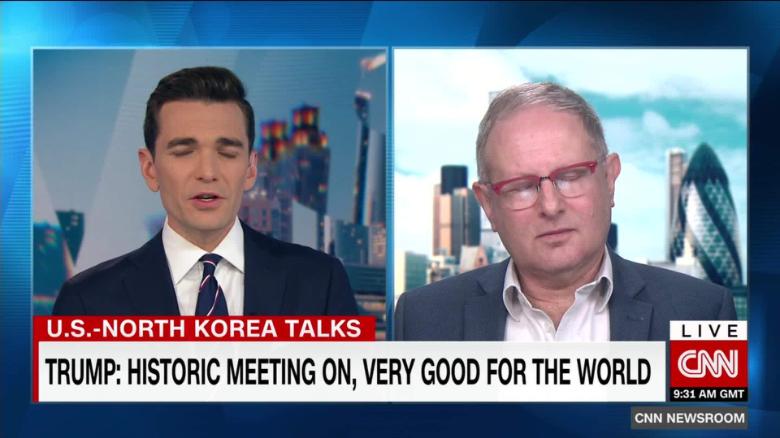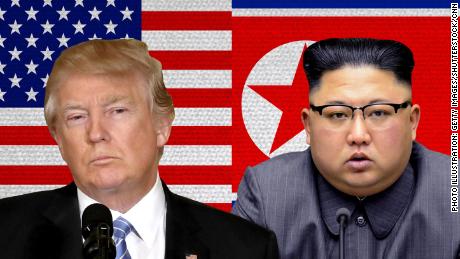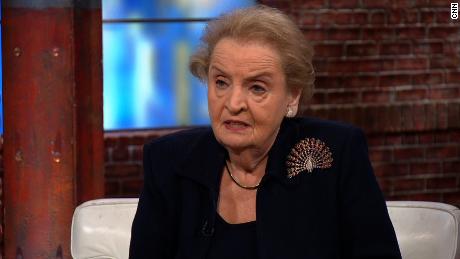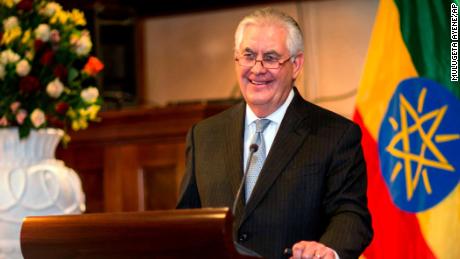Hong Kong (CNN)It's been a week since US President Donald Trump surprised the world -- and the White House -- by accepting an invitation to meet with North Korea's reclusive leader Kim Jong Un.
The message was delivered to Trump by a South Korean delegation, who in the seven days since, have been involved in a whirlwind of international diplomacy and consensus building, flying from Seoul and Washington to meet with allies in Beijing, Moscow and Tokyo.
Meanwhile, their neighbors to the North have remained inscrutable on the subject.
North Korean State broadcaster Korea Central Television opened its first news bulletin after the news of Trump's announcement with a story about passenger riverboat travel in Pyongyang. KCNA, the North Korean newswire, led with a report about industrial production levels in the capital.
The first significant diplomatic move by Pyongyang didn't come until Thursday when Sweden announced that North Korea's foreign minister was on his way to the country for two days of talks.
There he will meet his Swedish counterpart and "address the security situation on the Korean Peninsula," the Swedish government, which represents US interests in North Korea, said in a statement.
Slow in responding
On the face of it, the lack of a reaction from North Korea appears odd, but it might not be that unusual given the hermit nation's past behavior.
When the North Koreans decided to invite President Bill Clinton to Pyongyang in 2000, the formal invitation came months after Secretary of State Madeleine Albright met with her North Korean counterpart on the sidelines of an Asian nations' summit in July. The pair discussed whether then-leader Kim Jong Il would send an emissary to Washington DC to extend a formal invite to Clinton.
"Once again, the North Koreans were deliberate -- which is to say slow -- in responding," Albright wrote in her book "Madame Secretary."
"Unused to consulting with a democracy, they had the habit of doing nothing for months, then making a decision and expecting an immediate response."
Indeed, she notes that it was in October that year [right before the November elections] that the country's second most powerful military official arrived in Washington, and in full military uniform presented a letter of invitation to Clinton.
It's possible, says Mike Chinoy, the author of "Meltdown: The Inside Story of the North Korean Nuclear Crisis, "that the South Korean envoys may not have accurately conveyed what Kim said to Trump, "let alone what he meant."
"Don't count your summits until they hatch," warned Chinoy, who was CNN's Beijing bureau chief from 1987 to 1995 and has visited North Korea 17 times.
But diplomatic sources have signaled enough confidence in South Korea's words and actions that most of the parties are pressing ahead with planning for the summit, even as the details of where, when and who will attend, remain undetermined.
Full steam ahead
Back from a four-day visit to China and Russia, South Korean envoy Chung Eui-yong said China's President Xi Jinping fully supported South Korean President Moon Jae-in's efforts to build dialogue with North Korea.
Chung declared that Xi was "delighted" with the development, and even offered a traditional Chinese proverb "once hard ice melts, spring comes and flowers bloom," to describe the current situation on the Korean peninsula.
Japan was more circumspect. At the beginning of a meeting on Tuesday with Suh Hoon, South Korea's National Intelligence Service chief, Japanese Prime Minister Shinzo Abe said it was "extremely important" that the North Korean regime "takes concrete action which realize their words" with regards to denuclearization.
Days before Secretary of State Rex Tillerson was fired by Trump, White House Press Secretary Sarah Huckabee Sanders told reporters the administration "fully expected" the meeting between the two leaders to take place.
"The offer was made and we've accepted," she said on Monday during a briefing with the press. "North Korea made sereval promises and if -- we hope that they would stick to those promises and, if so, the meeting will go on as planned."
When asked what preparations were being made so far she declined to give much detail. "Most of that is an inter-administration, interagency process and I'm not going to get ahead of any of the details of the where, the when, or any of that here today," Sanders said.
She refused to answer questions about whether Kim Jong Un has been using a special envoy to Seoul to send messages to Trump.
Trump talk
And while the world waits for word from Kim Jong Un, the man he is expected to meet by the end of May cannot resist talking, and sometimes about issues that could be to his allies' detriment.
In a fundraising speech on Wednesday, President Trump appeared to threaten to remove American troops from South Korea if he didn't get the trade deal with Seoul that he wants, The Washington Post reported.
"We have a very big trade deficit with them, and we protect them," Trump said about South Korea. "We lose money on trade, and we lose money on the military. We have right now 32,000 soldiers between North and South Korea. Let's see what happens."
The US has some 28,000 troops based in South Korea. The two countries' joint military exercises include group, air, naval and special operations drills, and have long been a point of contention for Pyongyang.
Seo Jeeyeon, a spokeswoman from South Korea's trade ministry, said: "We're not in a position to be able to make comments every time President Trump makes remarks."
Meanwhile on Thursday, the first mention of the US by a North Korean public broadcaster addressed a report by the United Nations highlighting the isolated nation's dismal human rights record, by aiming at the US' treatment of its own people.
It was the "height of folly for the US, which has seriously threatened the right to existence of the Korean people through persistent sanctions and blockade to violate the sovereignty of the DPRK [Democratic People's Republic of Korea] with nuclear weapons for decades, to voice 'concern' about its 'human rights performance,'" said KCNA.
"The world's worst human rights abuser is none other than the US," the report said.
There was no word about a Trump-Kim summit.












